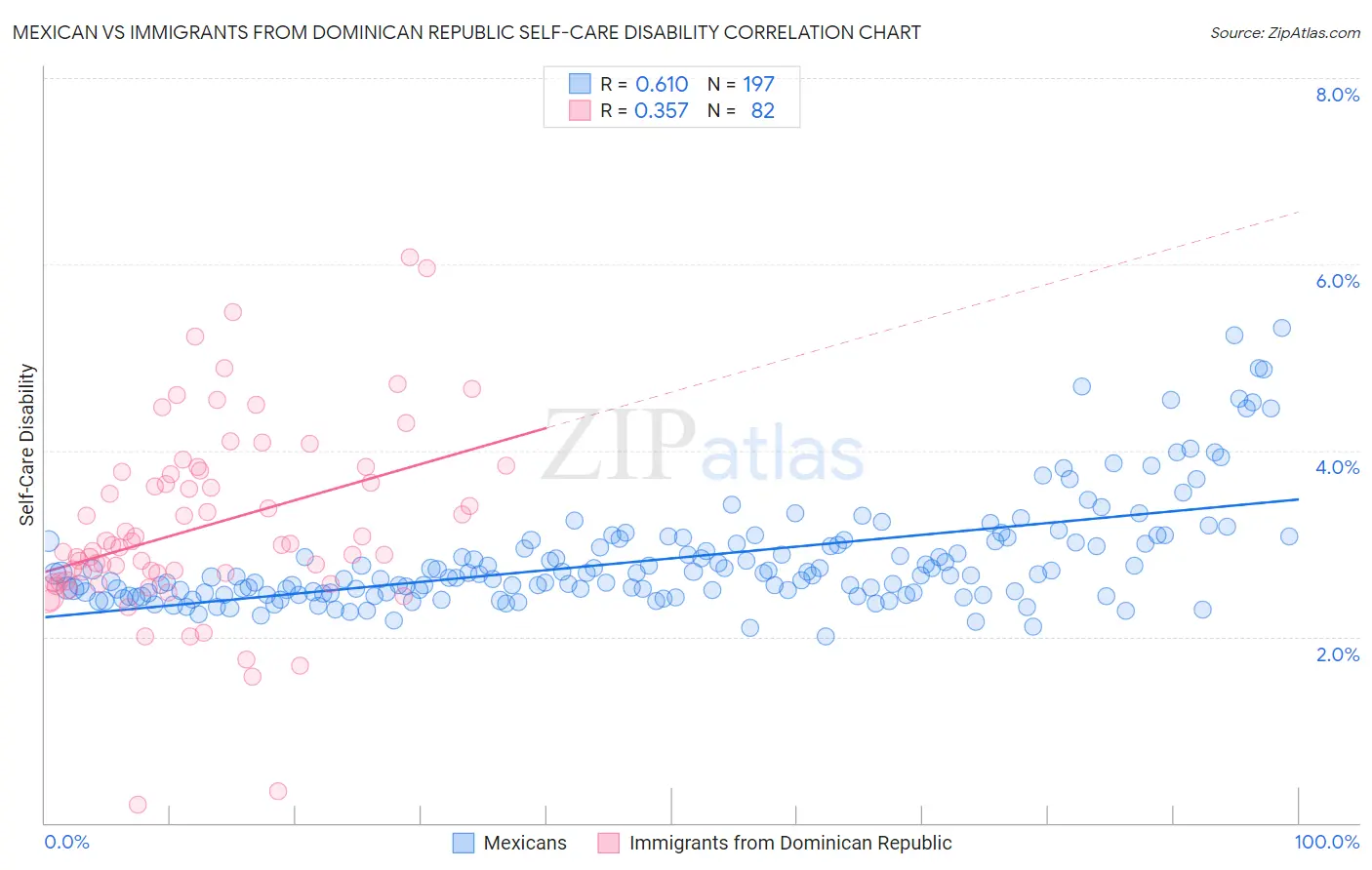Mexican vs Immigrants from Dominican Republic Self-Care Disability
COMPARE
Mexican
Immigrants from Dominican Republic
Self-Care Disability
Self-Care Disability Comparison
Mexicans
Immigrants from Dominican Republic
2.7%
SELF-CARE DISABILITY
0.1/ 100
METRIC RATING
273rd/ 347
METRIC RANK
3.0%
SELF-CARE DISABILITY
0.0/ 100
METRIC RATING
339th/ 347
METRIC RANK
Mexican vs Immigrants from Dominican Republic Self-Care Disability Correlation Chart
The statistical analysis conducted on geographies consisting of 563,049,002 people shows a significant positive correlation between the proportion of Mexicans and percentage of population with self-care disability in the United States with a correlation coefficient (R) of 0.610 and weighted average of 2.7%. Similarly, the statistical analysis conducted on geographies consisting of 274,850,038 people shows a mild positive correlation between the proportion of Immigrants from Dominican Republic and percentage of population with self-care disability in the United States with a correlation coefficient (R) of 0.357 and weighted average of 3.0%, a difference of 13.8%.

Self-Care Disability Correlation Summary
| Measurement | Mexican | Immigrants from Dominican Republic |
| Minimum | 2.0% | 0.19% |
| Maximum | 5.3% | 6.1% |
| Range | 3.3% | 5.9% |
| Mean | 2.8% | 3.2% |
| Median | 2.7% | 3.0% |
| Interquartile 25% (IQ1) | 2.5% | 2.6% |
| Interquartile 75% (IQ3) | 3.0% | 3.8% |
| Interquartile Range (IQR) | 0.54% | 1.2% |
| Standard Deviation (Sample) | 0.59% | 1.0% |
| Standard Deviation (Population) | 0.59% | 1.0% |
Similar Demographics by Self-Care Disability
Demographics Similar to Mexicans by Self-Care Disability
In terms of self-care disability, the demographic groups most similar to Mexicans are Yakama (2.7%, a difference of 0.060%), Immigrants from Trinidad and Tobago (2.7%, a difference of 0.060%), Immigrants from Laos (2.7%, a difference of 0.13%), Trinidadian and Tobagonian (2.7%, a difference of 0.18%), and Japanese (2.7%, a difference of 0.19%).
| Demographics | Rating | Rank | Self-Care Disability |
| Immigrants | Cambodia | 0.1 /100 | #266 | Tragic 2.7% |
| Yaqui | 0.1 /100 | #267 | Tragic 2.7% |
| Immigrants | Mexico | 0.1 /100 | #268 | Tragic 2.7% |
| U.S. Virgin Islanders | 0.1 /100 | #269 | Tragic 2.7% |
| Immigrants | Micronesia | 0.1 /100 | #270 | Tragic 2.7% |
| Trinidadians and Tobagonians | 0.1 /100 | #271 | Tragic 2.7% |
| Immigrants | Laos | 0.1 /100 | #272 | Tragic 2.7% |
| Mexicans | 0.1 /100 | #273 | Tragic 2.7% |
| Yakama | 0.1 /100 | #274 | Tragic 2.7% |
| Immigrants | Trinidad and Tobago | 0.1 /100 | #275 | Tragic 2.7% |
| Japanese | 0.1 /100 | #276 | Tragic 2.7% |
| Immigrants | Ukraine | 0.1 /100 | #277 | Tragic 2.7% |
| Ottawa | 0.1 /100 | #278 | Tragic 2.7% |
| Iroquois | 0.1 /100 | #279 | Tragic 2.7% |
| Hispanics or Latinos | 0.1 /100 | #280 | Tragic 2.7% |
Demographics Similar to Immigrants from Dominican Republic by Self-Care Disability
In terms of self-care disability, the demographic groups most similar to Immigrants from Dominican Republic are Immigrants from Cabo Verde (3.1%, a difference of 0.33%), Cape Verdean (3.0%, a difference of 0.38%), Dominican (3.1%, a difference of 0.59%), Choctaw (3.0%, a difference of 0.69%), and Immigrants from Yemen (3.0%, a difference of 1.8%).
| Demographics | Rating | Rank | Self-Care Disability |
| Kiowa | 0.0 /100 | #332 | Tragic 3.0% |
| Dutch West Indians | 0.0 /100 | #333 | Tragic 3.0% |
| Houma | 0.0 /100 | #334 | Tragic 3.0% |
| Immigrants | Azores | 0.0 /100 | #335 | Tragic 3.0% |
| Immigrants | Yemen | 0.0 /100 | #336 | Tragic 3.0% |
| Choctaw | 0.0 /100 | #337 | Tragic 3.0% |
| Cape Verdeans | 0.0 /100 | #338 | Tragic 3.0% |
| Immigrants | Dominican Republic | 0.0 /100 | #339 | Tragic 3.0% |
| Immigrants | Cabo Verde | 0.0 /100 | #340 | Tragic 3.1% |
| Dominicans | 0.0 /100 | #341 | Tragic 3.1% |
| Colville | 0.0 /100 | #342 | Tragic 3.1% |
| Tohono O'odham | 0.0 /100 | #343 | Tragic 3.1% |
| Pueblo | 0.0 /100 | #344 | Tragic 3.3% |
| Armenians | 0.0 /100 | #345 | Tragic 3.4% |
| Puerto Ricans | 0.0 /100 | #346 | Tragic 3.7% |